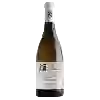
Winery Antoine de VarennesPommard
This wine generally goes well with poultry, beef or veal.
Food and wine pairings with Pommard
Pairings that work perfectly with Pommard
Original food and wine pairings with Pommard
The Pommard of Winery Antoine de Varennes matches generally quite well with dishes of beef, veal or game (deer, venison) such as recipes of authentic bolognese sauce (ragù di carne), locro criollo (argentina) or duck aiguillettes.
Details and technical informations about Winery Antoine de Varennes's Pommard.
Discover the grape variety: Pinot noir
Pinot noir is an important red grape variety in Burgundy and Champagne, and its reputation is well known! Great wines such as the Domaine de la Romanée Conti elaborate their wines from this famous grape variety, and make it a great variety. When properly vinified, pinot noit produces red wines of great finesse, with a wide range of aromas depending on its advancement (fruit, undergrowth, leather). it is also the only red grape variety authorized in Alsace. Pinot Noir is not easily cultivated beyond our borders, although it has enjoyed some success in Oregon, the United States, Australia and New Zealand.
Informations about the Winery Antoine de Varennes
The Winery Antoine de Varennes is one of of the world's greatest estates. It offers 6 wines for sale in the of Pommard to come and discover on site or to buy online.
The wine region of Pommard
The wine region of Pommard is located in the region of Côte de Beaune of Burgundy of France. Wineries and vineyards like the Domaine Leroy or the Château de Pommard produce mainly wines red. The most planted grape varieties in the region of Pommard are Pinot noir, Cabernet-Sauvignon and Gamay noir, they are then used in wines in blends or as a single variety. On the nose of Pommard often reveals types of flavors of cherry, truffle or clove and sometimes also flavors of game, cheese or rose petal.
The wine region of Burgundy
Bourgogne is the catch-all regional appellation title of the Burgundy wine region in eastern France ("Bourgogne" is the French name for Burgundy). Burgundy has a Complex and comprehensive appellation system; counting Premier Cru and Grand Cru titles, the region has over 700 appellation titles for its wines. Thus, Burgundy wines often come from one Vineyard (or several separate vineyards) without an appellation title specific to the region, Village or even vineyard. A standard Burgundy wine may be made from grapes grown in one or more of Burgundy's 300 communes.
The word of the wine: Brut nature (or ultra brut)
A type of champagne that has not received any dosage liqueur.














